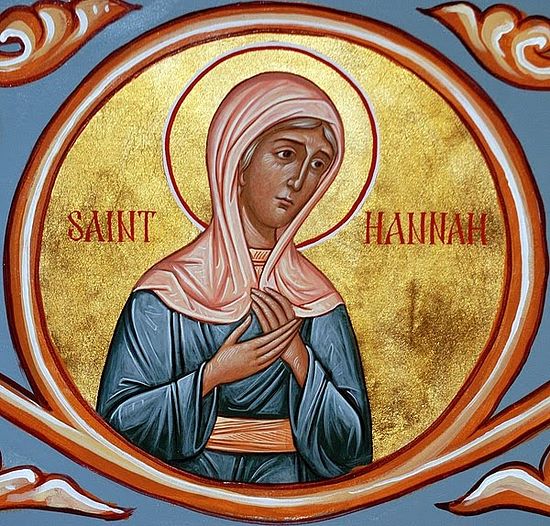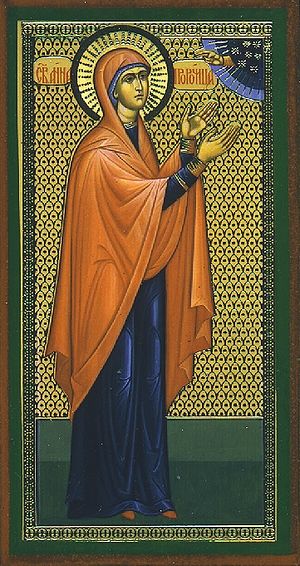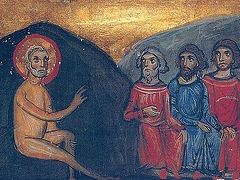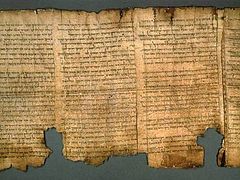The Prophetess Hannah, mother of the Prophet Samuel, is an important person in the Old Testament, with ardent faith and absolute trust in God's love. By the depth of her prayer she drew the mercy of God and received what she desired, namely to bear a child. Because she was barren and childless, her husband Elkanah married another woman, Peninnah, by whom he had five children. Childlessness was considered a shame at that time. Because she was scoffed at by her rival Peninnah, and even by relatives and friends, Hannah was sad. But she did not despair, because she based her hope in God and found solace in prayer. She prayed with great intensity and deep pain. Once, while praying in the Temple, the Priest Eli scolded her, because he thought she was drunk, but in fact she was opening her heart to God. Eventually, her prayer was heard and God gave her not one or two, but six children. After Samuel, whom she dedicated to God, she gave birth to three sons and two daughters and in this way the sterile one became fertile with many children. Indeed, she surpassed Peninnah, who gave birth to five children. Wanting to show gratitude to God for the gifts of His love, she wrote a wonderful hymn, which is called the Ode of the Prophetess Hannah and is the third in a series of odes among nine odes of the hymnological canon. It is a thanksgiving and doxology to the Lord, who "solidified her heart."
The Ode of the Prophetess Hannah, as well as her entire life and state of being, gives us the opportunity to emphasize the following:
First, the Saints are tried in their life with many and great temptations. Sometimes they are even literally crushed by certain events, but they are not frustrated and do not despair because they have trust in the love of God and they know that nothing can take place without the will or permission of God. They do not turn against those who bring to them pain and grief and became a cause for their torture and suffering, but they take refuge in God through prayer and ask for strength to bear the temptation. There are cases where people literally kneel under the weight of difficulties and sorrows. Then the only way to conquer despair is to fall into the arms of Christ with prayer, as Elder Porphyrios would characteristically say, like a small child in the arms of their father, and they would certainly receive courage and strength. Their heart will warm from the true love and will feel true comfort. Despair is inherent to those who have not tasted of the uncreated Grace of God, nor tasted the sweetness of His love and who place the support of their hope in people or things rather than God. These people, unfortunately, have nothing to support themselves on nor anything to draw strength from in order to face the difficulties and setbacks of life, and are thus led to a dead end, and sometimes to tragic acts with unfavorable outcomes for their life and their eternal future.
Second, the Prophetess Hannah was a person of prayer. She prayed with her nous and her heart and her prayer was not a typical religious duty, but an internal drive and a personal communication with the personal God of her fathers. She had love, pain and intensity, which are characteristic features of true prayer. It was a cry from the depths, the depths of her heart, to the God of knowledge, as she calls Him, because He knows all things and all people and He knows those who truly love Him.
The Prophetess Hannah knew God truly. She did not think of Him or know Him only from stories of others or from books, but she had an experience of God, having received the Holy Spirit, "Who spoke through the Prophets." When the Apostles received the Holy Spirit on the day of Pentecost, whoever saw them or heard them speak, passed them off for drunks. The Prophetess Hannah, when she opened her heart to God inside the Temple, must have been "filled with the Holy Spirit," which is why Eli passed her off for a drunk.
She received from God the gift of unceasing noetic prayer, because she loved prayer. For prayer is a gift from God and is given to those who pray. God is "the One who gives prayer to the prayerful," as she chants in her Ode and knew from experience.
Usually people call others spiritual who are engaged in the arts and in writing, the so-called Intellectuals. In reality, however, spiritual people are those who have been given the Grace of the Holy Spirit, and these are the Saints. The inner life of spiritual people is hidden from the eyes of people of the flesh, or those who have not tasted of the Holy Spirit. This is why they are not able to understand the words and actions of the Saints and perceive certain of their actions as actions of the insane and the intoxicated.
Indeed, unceasing deep prayer and communion with the Holy Spirit is a drunkenness, but it is a sober drunkenness. And the madness of the Saints is a reasonable madness which heals our irrational madness. This is spiritual prowess and true manliness.
Protopresbyter George Papavarnavas
Translated by John Sanidopoulos
The Song of Righteous Hannah (1 Kg./1 Sam. 2:1-10)
1 And Hannah prayed, and said, My heart rejoiceth in the Lord, mine horn is exalted in the Lord: my mouth is enlarged over mine enemies; because I rejoice in thy salvation.
2 There is none holy as the Lord: for there is none beside thee: neither is there any rock like our God.
3 Talk no more so exceeding proudly; let not arrogancy come out of your mouth: for the Lord is a God of knowledge, and by him actions are weighed.
4 The bows of the mighty men are broken, and they that stumbled are girded with strength.
5 They that were full have hired out themselves for bread; and they that were hungry ceased: so that the barren hath born seven; and she that hath many children is waxed feeble.
6 The Lord killeth, and maketh alive: he bringeth down to the grave, and bringeth up.
7 The Lord maketh poor, and maketh rich: he bringeth low, and lifteth up.
8 He raiseth up the poor out of the dust, and lifteth up the beggar from the dunghill, to set them among princes, and to make them inherit the throne of glory: for the pillars of the earth are the Lord's, and he hath set the world upon them.
9 He will keep the feet of his saints, and the wicked shall be silent in darkness; for by strength shall no man prevail.
10 The adversaries of the Lord shall be broken to pieces; out of heaven shall he thunder upon them: the Lord shall judge the ends of the earth; and he shall give strength unto his king, and exalt the horn of his anointed.





